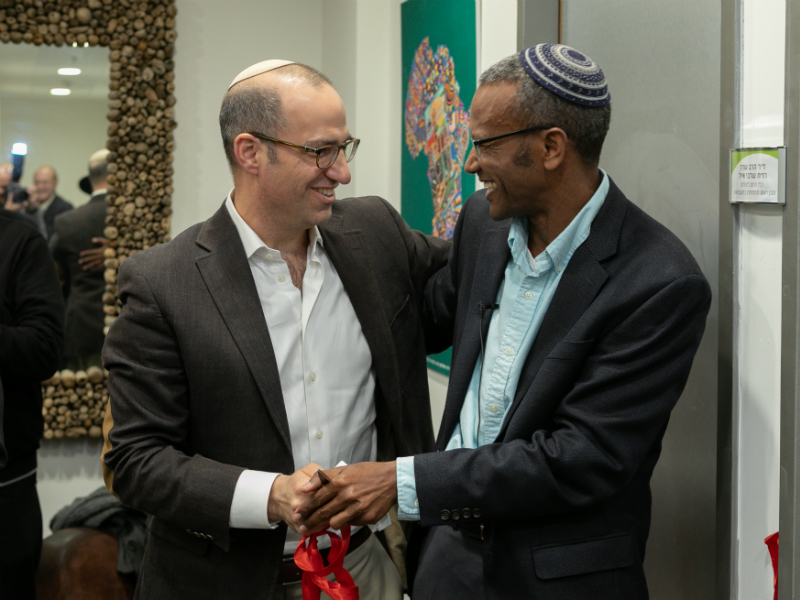The International Center for the Study of Ethiopian Jewry, a brand-new hub for the exploration of the beliefs and traditions of Jews of Ethiopian origin at Ono Academic College in Kiryat Ono, near Tel Aviv, was inaugurated with a gala event on Jan. 6.
Speaking at the event were Tsegay Berha, Ethiopia’s ambassador to Israel, Montrealer Ilan Gewurz, whose family dedicated the centre’s chair for research of Ethiopian Jewry, the first position of its kind in the world, and Rabbi Sharon Shalom, the centre’s inaugural chairperson.
The decision to found the chair came about very organically, said Gewurz, whose family is behind a number of philanthropic endeavours in Canada and Israel. Years ago, he served with Rabbi Shalom in the IDF’s Givati infantry brigade and although the two lost touch, they were reunited in Montreal years later when Rabbi Shalom spoke at Congregation Tifereth Beth David Jerusalem.
The entire family was captivated by Rabbi Shalom’s impassioned drive not only to share the history and beliefs of Ethiopian Jewry, but also to demonstrate how they can contribute to the Jewish conversation worldwide. And Ono Academic College – a private college with 13,000 students that was founded in 1995 by Montreal native Ranan Hartman, son of the late rabbi and philosopher David Hartman – seemed like the perfect location. Through a wide range of initiatives – including programs for haredi, Arab and autistic people, and an Ethiopian-Israeli leadership program that has already seen two graduates go on to serve in the Knesset – the college has demonstrated its serious ongoing commitment to reflecting Israel’s diversity.
Beyond academic study, one of Rabbi Shalom’s first goals for the centre is sharing the story of Ethiopian Jewry in elementary and high schools, first in North America and later in Israel. Rabbi Shalom has been working alongside scholars and educators at Brandeis University to create a curriculum that will be rolled out in the next school year.
Ethiopian Jews are often misunderstood, Rabbi Shalom told The CJN. They didn’t leave Ethiopia because they were hungry, but because they were full of hope: “We were very rich, we had a great life in Ethiopia, (but) we walked thousands of kilometres from Ethiopia because of the dream.”
Rabbi Shalom walked to Israel with his extended family when he was eight or nine (he never observed his birthday in Ethiopia), only to be told when he arrived that his parents and siblings were dead. Astonishingly, two years after reconciling himself to being an orphan, he was informed that a mistake had been made and he was reunited with his family in Israel.
READ: MILITARY COMMANDERS HONOUR CANADIAN-ISRAELI WAR VET IN HAIFA
For Rabbi Shalom, Ethiopian Jewish philosophy offers a fundamentally different perspective on human nature. “In the Talmud, the approach is 80 per cent very negative, but in Ethiopia, 100 per cent, the approach is that human nature is good,” he said.
Separated from the Jewish mainstream for so long, Ethiopian Judaism may offer other Jews a snapshot of authentic pre-Talmudic Jewish traditions and beliefs. Drawing on an image of human beings as fundamentally good creates Ethiopian Jews offer an entirely different approach to halakhah (Jewish law), one in which far more is permitted and there is more tolerance for diversity of belief and practice.
“Difference is not the problem. Difference is a blessing. Reform, Conservative, haredi, secular … we need all these perspectives to put together the puzzle of the Jewish people,” said Rabbi Shalom.
Rabbi Shalom said that one of the reasons the centre is focussing first on educating North American students about Ethiopian Jewry is because he believes they will be less resistant to expanding the Jewish story beyond the standard Ashkenazic narrative. Changing entrenched attitudes can be more difficult in Israel.
A friend of his, who’s also of Ethiopian origin, was harshly rebuffed in 2016, when she participated in an Israeli Ministry of Education committee tasked with introducing Mizrachi narratives into the school curriculum. When she asked about including Ethiopian content, she was told that, “We’ve waited 40 years to be able to tell our story. You just got here, now you need to wait.”
Gewurz believes the time is right to share the story of Ethiopian Jews, now that many of them have gained a stronger foothold in Israel. “Now you have a generation of people who remember Ethiopia, but are really Israeli and powerful enough to give voice to their needs and interests and journey,” he said.
Rabbi Shalom hopes their message will find a receptive audience in North America, which can then serve as a springboard for success back in Israel. “American Jews are more open, more liberal, more multicultural. And we are sharing something very positive,” said Rabbi Shalom.
He cautions that the curriculum shouldn’t devolve into “learning how black Jews came to Israel and they’re very cute and they’re very nice,” but should explore their core beliefs and the hope that sustained them through 2,000 years of exile. “The philosopher Nietzsche said that hope is illusion,” said Rabbi Shalom. “We don’t believe that.”
Speaking at the inauguration, which featured a rich buffet of Ethiopian delicacies, Ambassador Berha praised the “marvellous history and culture of Ethiopian Jews and Israelis.” Today, there are about 144,000 Israelis of Ethiopian origin, with another 8,200 Falash Mura, descendants of Jews who are ineligible for aliyah since their ancestors converted to Christianity, still in Ethiopia.
Gewurz said that supporting the centre feels very natural for his family, since they are part of an English-speaking minority in a French-speaking province. “It celebrates multiple ways to be part of a nation,” he said. “We’re stronger when we tell the story of the different ways to be Jewish and the different journeys that the Jewish people have experienced.
“We hope it will evolve and develop in ways we can’t yet imagine.”
